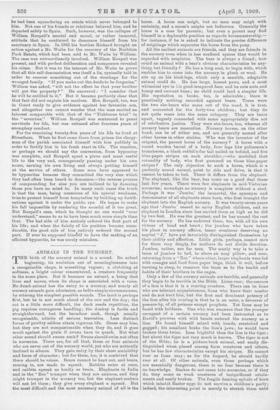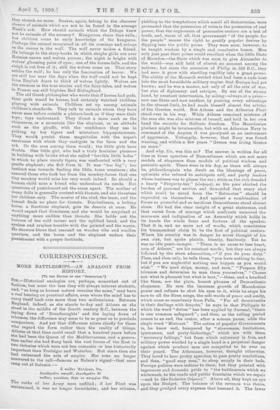ANIMALS IN THE NURSERY.
THE birth of the nursery animal is a sound. Its actual beginning, its evolution out of meaninglessness into a recognisable shape, is something vaguer; a clutching at softness, a bright colour remembered, a creature frequently in the same place. But it becomes an animal, a being that lives and moves, when its shape is associated with a voice. No dumb animal has the entry to a nursery, and nearly all nursery animals gain admission, as befits simple circumstances, by uttering the simplest possible sounds. The lamb is perhaps first, but he is not much ahead of the cow and the dog ; the cat is a little more difficult, the duck needs repetition, the pig requires courageous handling ; the donkey is facile and straightforward, but the barndoor cock, though usually recognisable, admits of serious travesties. Less distinct forms of poultry seldom attain vigorous life. Geese may hies, but they are not companionable when they do, and it goes much against the grain if swans have to quack. But what other sound should swans emit? Swans should swim not often in nurseries. There are, for all that, three or four animale who are never out of the nursery world, yet who are naturally inclined to silence. They gain entry by their sheer amiability and force of character; but for them, too, it is contrived that there should be voices. Bears cannot be kept out, and bears, coming in, are made to squeak. Rabbits enter at once, and rabbits squeak as loudly as bears. Elephants in India and in the "Zoo" trumpet when they are anxious, and they might trumpet in the nursery too, but the elephant-makers will not let them ; they give every elephant a squeak. But the most difficult and the most necessary animal of all is the
horse. A horse can neigh, but no man may neigh with certainty, and a nurse's neighs are ludicrous. Generally the horse is a case for parents; but even a parent may find himself in a deplorable position as regards horsemastership,— for instance, if he is asked to indicate the precise difference of neighings which separates the horse from the pony.
All the earliest animals are friends, and they are friends in the nursery even when in less confined spaces they would be regarded with suspicion. The bear is always a friend ; how could an animal with a bear's obvious characteristics be any- thing but friendly ? He has a long coat, to begin with, which enables him to come into the nursery in plush or wool. He sits up on his hind-legs, which only a sensible, adaptable animal could do. He has large, honest paws, and a most whimsical eye in Lis good-tempered face, and he eats nuts and honey and currant buns ; no child could lead a simpler life. His reputation in books, too, is admirable ; there is practically nothing recorded against bears. There were the two she-bears who came out of the wood, it is true, and accounted for the forty-two children ; but they do not quite come into the same category. They are bears apart, vaguely connected with some appropriately dire act of retributive justice. They were she-bears, too, whereas all nursery bears are masculine. Nursery horses, on the other band, can be of either sex, and are generally named after other horses in other stables. Who was the inventor of the original, the parent horse of the nursery P A horse with a round wooden barrel of a body, four legs like policemen's truncheons, a black rabbit's-fur tail nailed on behind, and five blue-paper stripes on each shoulder,—who modelled that rotundity of body, who first gummed on those blue-paper stripes ? The only objection to such a horse, which is a perfectly sound animal, quiet to ride and drive, is that it cannot be taken to bed. There it differs from the elephant. The elephant, like the bear, has come on a good deal these last few years. There were few elephants in mid-Victorian nurseries; nowadays no nursery is complete without a stud. Perhaps it was 'Jumbo,' the immortal, the synonym and denominator of all elephants since born, who first brought the elephant into the English nursery. It was twenty-seven years ago that 'Jumbo' ceased to carry English children, and no elephant in London since has carried them as high as he did by two feet. He was the greatest, and he has named the rest for the nursery. He has endowed them, too, with all his own virtues of head and heart ; the 'jumbos who have taken his place in nursery affairs, lesser creatures deserving no capital "J," have yet invariably distinguished themselves by their ability and affection. Little girls, perhaps, cannot care for them very deeply, for mothers do not divide devotion. Jumbos, rather, are for men. The manly way is to take a team of jumbos to bed, to share an easy pillow; and men, returning from a " Zoo " where other, larger elephants were fed with oranges and food from paper bags, think it well, before turning to sleep, to reassure the team as to the health and habits of their brothers in the cages.
Only a few of the nursery animals are terrible, and generally they begin to be terrible in time Bible. Lions roar; the essence of a lion is that it is a roaring creature. There can be lions who are tolerant acquaintances, lions who know their master and do not hurt him, but the first and dominant potency of the lion after his roaring is that he is an eater, a devourer of passers-by, of all pefsons except prophets. Yet lions may be faced with boldness. One who was unaware that the younger occupant of a certain nursery had been instructed as to David's prowess with wild beasts entered the nursery as a lion. He found himself seized with hands, scratched and gagged ; his assailant brake the lion's jaws ; he would have broken them twice. Less frightful than the lion is the tiger ; but about the tiger not very much is known. The tiger is not of the Bible; he is a picture-book animal, and easily dis- tinguished when placed among farm creatures and others, but he has few characteristics except his stripes. He cannot roar as lions may ; as for the leopard, he should hardly roar at all. Of other animals, even those perhaps which are essentially dangerous, there is no fear because there is no knowledge. Snakes do not come into nurseries, or if they do, they come as weak creatures of insignificant attain- ments and easily broken. The fragile dancing spirals of horn which inhabit Easter eggs do not survive a children's party; indeed, the interesting point is merely to stretch them until
they stretch no more. Snakes, again, belong to the obscurer Classes of animals which are not to be found in the average Noah's ark. How should animals which the Deluge knew not be animals of the nursery P Kangaroos share that exile; few children come to early knowledge of the kangaroo. Perhaps the animal recognised in all its comings and goings as the enemy is the wolf. The wolf never makes a friend. He belongs to the story-books in which sleighs glide out over Russian snows and wolves pursue ; the night is bright with wolves' gleaming pairs of eyes ; one of the horses falls, and the sleigh is cut free of it; still the wolves come on. That story settles the wolf ; he has only the fascination of terror. We are still too near the days when the wolf could not be kept from English doors to think of wolves lightly. Wolves are the enemies in thelrue stories and the fairy-tales, and wolves in France can still frighten Red Ridinghood.
The old Greek philosopher who wrote that if horses had gods, their gods would be horses, had certainly watched children Playing with animals. Children set up among animals children's standards. They talk to animals whom they have never seen before outside a picture-book as if they were their toys ; toys understand. They direct a mass such as the rhinoceros, or a mountain like the elephant, or an altitude finch as the giraffe, with the confidence they use in Picking up toy tigers and miniature hippopotamuses. They would, punish these magnitudes with the enperb eseurance with which they castigate in the farm and the ark. Or the men among them would ; the little girls have doubts. One little girl, who had a truly feminine pleasure in building with bricks what she called "terrible little holes" in which to place unruly tigers, was confronted with a very gentle elephant; she fled from it. It was "too big"; her instinct was towards feeding the little, time creatures ; she assured those who took her from the monkey-house that one tiny monkey would miss her very much indeed. So should a human child miss a friend who understood its needs. But questions of punishment set the sexes apart. The mother of many dolls is generally content with threats, and she threatens her children only. The master of the stud, the team, and the kennel fade no place for threats. Disobedience, a bolting horse, a fractious elephant, gets its deserts at once. He would expect that directness, and she would be surprised at anything more sudden than threats. She holds out the horrors of the cold corner and the uplifted hand, and the eyeless and armless tremble with the painted and the waxen, Ire showers blows that resound on wooden ribs and woollen quarters, and the horse and the elephant endure their Punishment with a proper fortitude.











































 Previous page
Previous page